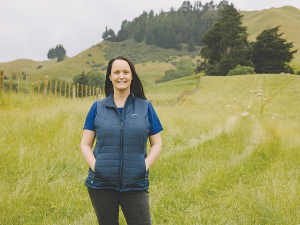Fonterra’s exit from Australia ‘a major event’
Fonterra’s impending exit from the Australian dairy industry is a major event but the story doesn’t change too much for farmers.
 Emma Higgins says farmgate prices are moving lower in 2023 in part due to global milk supply returning to growth.
Emma Higgins says farmgate prices are moving lower in 2023 in part due to global milk supply returning to growth.
Rabobank has announced an opening farmgate milk forecast of $8.20kg/MS for the 2023/24 season, while also highlighting vastly changed global dairy markets.
In its New Zealand Dairy Seasonal Outlook 2023/24 report, titled The Pressure Is On, report author and senior agricultural analyst Emma Higgins says this forecast is due to farmgate prices catching up to global commodity market trends. She adds that prices are moving lower in 2023 in part due to global milk supply returning to growth in key production regions, while China rebalancing its internal markets is expected to subdue dairy demand until the latter part of the year.
"At this stage last year, market fundamentals were very tight with limited supplies in export regions, aggressive import demand by Chinese buyers and supply chain issues exacerbating buyers' urgency to procure raw materials," Higgins explains.
"Since then, we've seen a return to growth in milk supply across most of the export regions, sluggish Chinese import volumes and widespread demand rationing in many other dairy markets across retail, foodservice and ingredient channels in response to food price inflation and higher sticker prices."
She adds that global dairy market fundamentals are likely to remain under stress in the short-term future.
As a result, commodity prices for whole milk powder (WMP) and skim milk powder (SMP) fell between 30 and 40% since peak commodity prices in 2022 and are now at or below the average price over the previous five years. Rabobank says farmgate milk prices are feeling the pressure in most export regions.
Higgins explains that milk prices in export regions have followed the commodity cycle. She says the cycle will turn and prices will rebound - but the timing of this will hinge on meaningful imports from Chinese buyers, whose local inventories are being worked through.
"The short-term outlook suggests more pressure is possible, but later in 2023 we should see more meaningful purchasing activity from China," she adds. "Coupled with improved demand tension from other buying regions in the face of low buy-side inventories... these factors will help buoy global dairy markets as we move through this year."
Higgins says China's ability to increase domestic production will be impacted by New Zealand's decision to end live exports. Combined Australian-New Zealand volumes in 2023 set a new record for herd expansion, with the equivalent of Taranaki's annual milk production being added each year since 2018.
Beyond dairy market supply and demand fundamentals, Rabobank reports that a host of broader macroeconomic and geopolitical uncertainties - including deglobalisation, central bank policies and the threat of war - present both upside and downside risk to the bank's milk price forecast.
Given rapidly shifting dynamics, the report recommends farmers consider the possible impacts of central banks monetary policies in case of recession or inflation developments - as well as the possibility of conflict with China.
"The world has changed, and one thing is clear: the global trade architecture that we have grown accustomed to and comfortable with is changing, forcing New Zealand to re-evaluate trade relationships and diversify product mix and customers."
Controls on the movement of fruit and vegetables in the Auckland suburb of Mt Roskill have been lifted.
Fonterra farmer shareholders and unit holders are in line for another payment in April.
Farmers are being encouraged to take a closer look at the refrigerants running inside their on-farm systems, as international and domestic pressure continues to build on high global warming potential (GWP) 400-series refrigerants.
As expected, Fonterra has lifted its 2025-26 forecast farmgate milk price mid-point to $9.50/kgMS.
Bovonic says a return on investment study has found its automated mastitis detection technology, QuadSense, is delivering financial, labour, and animal-health benefits on New Zealand dairy farms worth an estimated $29,547 per season.
Pāmu has welcomed ten new apprentices into its 2026 intake, marking the second year of a scheme designed to equip the next generation of farmers with the skills, knowledge, and experience needed for a thriving career in agriculture.

OPINION: Here w go: the election date is set for November 7 and the politicians are out of the gate…
OPINION: ECan data was released a few days ago showing Canterbury farmers have made “giant strides on environmental performance”.